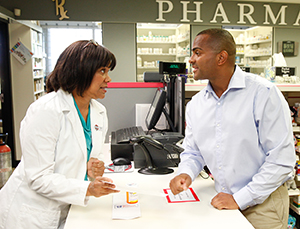Be Involved in Your Healthcare: Taking Medicines
When medicines are taken as directed, they can greatly improve your health. But if they are not taken as instructed, they may not work. In some cases, not taking them correctly can be harmful. To help make sure that your treatment remains effective and safe, understand your medicines and how to take them.

Reviewing your medicines
Medicines can interact with one another. They can also interact with herbal remedies and supplements. In either case, it can be harmful to your health. This is why your healthcare provider needs to know about every medicine, vitamin, herb, and supplement that you take. Schedule a visit with your healthcare provider or pharmacist to discuss all your medicines. Besides pills, your provider also needs to know about medicines for your skin (topical), such as oils, creams, and ointments. They also need to know about eye drops. Also, tell your provider about medicines that you take only occasionally and about any over-the-counter (OTC) medicines. When you go in for your visit, bring 1 of these :
OR
-
A list of all the prescription and OTC medicines, vitamins, herbs, and supplements that you take. Be sure to list how much you take and how often you take it.
Your healthcare provider or pharmacist will review your medicines with you. They can figure out if you are at risk for any medicine interactions. Depending on what you take, your prescriptions may be adjusted.
Some questions to ask your provider include:
-
Am I taking any medicines I no longer need?
-
How long should I take each medicine?
-
What are the side effects that should be reported?
-
Do any of the prescriptions and OTC medicines interact with each other in a way that will cause problems?
-
Are there any foods or drinks I should stay away from?
-
Are there any OTC medicines that I should stay away from because of my current medicines or because of my health condition? For instance, high blood pressure and OTC nasal decongestants?
Remembering to take medicines
Remembering to take medicines on time can be hard. Here are some tips to help you:
-
Develop a routine. For example, take your medicine at the same time each day, such as after you brush your teeth. This helps remind you to take it.
-
Schedule reminders on your computer, watch, or cell phone.
-
If you take more than one medicine, use a pillbox. Get one that lists the days of the week. If you take pills more than once a day, get a pillbox that has spaces for morning, noon, and evening. As you fill the pillbox, have the bottles with labels in front of you. This helps to prevent confusing pills that look alike.
-
Keep your medicine routine when you’re away from home. When traveling, make sure you bring enough for your entire trip plus 3 to 5 days of extra medicines in case of unplanned travel delays. When traveling by air, keep your medicines in your carry-on. Be sure you have your prescription labels (either the original package or a photocopy). To learn more about traveling with medicines, visit: www.tsa.gov .
Working with your healthcare provider
Follow up with your healthcare provider. This lets them see how well you are doing on the medicine. It may take a few tries to find the right dosage, medicine, or combination of medicines for you. Make sure you talk with your healthcare provider about the medicines you take and how they make you feel. And never stop taking a medicine without talking to your healthcare provider first. Some medicines should not be stopped suddenly. Others can cause problems if they are not taken for the prescribed amount of time.
Taking medicine safely
Below are some tips for taking medicine safely. If you have any questions about your medicines, call your healthcare provider or pharmacist:
-
Make sure to refill your prescription while you still have some left, so you don’t run out. If you use mail order, be sure to order with enough time for the refill to arrive while you still have some left.
-
Be sure refills are correct before taking them.
-
Hold on to the instructions that come with each medicine.
-
Don’t take less than the prescribed amount to save money. Talk to your healthcare provider if you can’t afford your medicines. There are resources that can help you.
-
Never share medicines.
-
Never increase or decrease your prescription medicine or stop taking it before talking to your provider.
-
Store medicines in a cool, dry, dark place. A steamy bathroom is often not the best place.
Online Medical Reviewer:
Marianne Fraser MSN RN
Online Medical Reviewer:
Rajadurai Samnishanth
Online Medical Reviewer:
Rita Sather RN
Date Last Reviewed:
3/1/2024
© 2000-2025 The StayWell Company, LLC. All rights reserved. This information is not intended as a substitute for professional medical care. Always follow your healthcare professional's instructions.